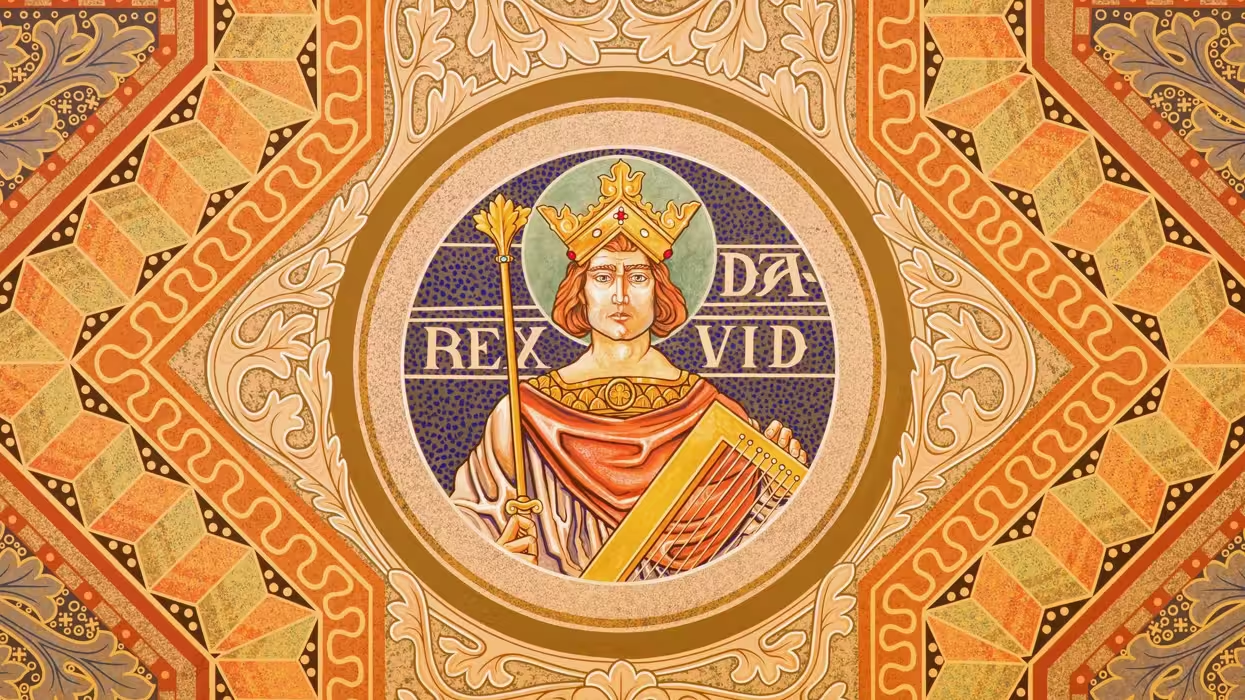© 2025 Blaze Media LLC. All rights reserved.
Atheist Leader: Claiming America Is a Christian Nation Is a 'Blatant Attempt to Rewrite Our History
October 02, 2012
"The more politicians proclaim their faith, the less we can trust them..."
This article is part of an ongoing Blaze series called, “Ask an Atheist.” Millionaire secular activist Todd Stiefel answers readers’ most pressing questions about faith and non-belief. Be sure to read part one, part two, part three and part four as well. The fifth installment, focusing upon politics and the separation of church and state, can be found, below.
--
TheBlaze has continued to take your questions for secular millionaire Todd Stiefel, an atheist who has contributed funds to some of the most controversial non-theist groups in America. In an effort to better understand how atheist activists operate, he has provided TheBlaze community with a plethora of answers to some of the most pressing questions about theology, politics and the ongoing debate surrounding the separation of church and state. In the fifth edition of "Ask an Atheist," Stiefel speaks out about his views on the current political schema.
For this round, TheBlaze worked with Stiefel to craft new questions based upon some of the most controversial sticking points that atheists and theists find themselves debating. In delivering his views, the secular leader stressed that his opinions are not necessarily associated with any of the organizations with which he works or represents. Considering that he's merely one of the many atheist activists working diligently to strip faith out of the public sphere, this cautionary note makes sense (after all, even atheist activists differ in their methodologies and views).

The first question that Stiefel addressed stretches back to the Republican National Convention this past August. The atheist leader took issue with Florida Sen. Marco Rubio's statement about religious values being integral to the nation's fabric. During his RNC speech, Rubio said, "Our national motto is 'In God we Trust,' reminding us that faith in our Creator is the most important American value of all."
When asked how this statement made Stiefel feel, he elaborated, lambasting Rubio over his comments:
This very statement shows a significant lack of American values. Pat Tillman gave his life in Afghanistan after leaving his NFL career early to defend his country in the wake of 9/11. He was also an atheist. Was Pat Tillman a bad American? Senator Rubio believes Corporal Tillman lacked the most important American value. I believe liberty is the most important American value, and that Pat Tillman was an American hero for fighting and dying defending our liberty.America’s founding document, the Constitution, does a good job outlining the most critical American values. It opens, “We the People of the United States, in Order to form a more perfect Union, establish Justice, insure domestic Tranquility, provide for the common defense, promote the general Welfare, and secure the Blessings of Liberty to ourselves and our Posterity, do ordain and establish this Constitution for the United States of America.”
Justice, tranquility and liberty are values we can all get behind. Instead of helping unite us behind common values, Sen. Rubio instead chose to divisively attack the patriotism of Buddhists, atheists, agnostics, and secular Jews. This country was founded on the concept of religious freedom for all. This is a land where people are to be treated equally by our government, regardless of their religion. Marco Rubio’s words show he thinks our elected representatives should drop civil equality in favor of defaming religious minorities for political gain.
It's important to note, though, that faith has played an important role in the formation of the nation. From its conception through today, America is certainly a Christian-majority nation, meaning that -- for most Americans -- God is an integral concept or, at the least, a stated personal belief. But this is besides the point. The vast majority of Americans believe in a God of some sort -- even if they reject the Christian theological explanation of a higher power.
As far as the offense of faiths goes, Rubio didn't say Jesus Christ, nor did he use any specific language aimed at Christians. He merely used the term "God," which most people of faith can, to some degree, relate to. That said, the values Stiefel noted are universal and, as he contended, they are tenets that most Americans can get behind.
The second question Stiefel answered was about the "God" debacle at the Democratic National Convention. In addressing the removal and the inevitable replacement of "God" in the party's official platform, Stiefel was candid. TheBlaze asked how he viewed the incident and whether he believes Democrats were being honest about how the word was "accidentally" omitted:
It is hard to say if any of our politicians are honest; it seems they will say anything to get elected. Adding “God” back into the platform proved that American politics has further devolved into a superficial show of who can be more publicly pious. It is sad that representatives of both parties correctly assume that some voters are gullible enough to fall for their sanctimonious banter. The more politicians proclaim their faith, the less we can trust them, and the more we can be certain that they are pandering to people’s faith in order to manipulate voters.I would recommend they take the advice of Jesus, from Matthew 6:5-6, “And when you pray, do not be like the hypocrites, for they love to pray standing in the synagogues and on the street corners to be seen by men. I tell you the truth, they have received their reward in full. But when you pray, go into your room, close the door and pray to your Father, who is unseen. Then your Father, who sees what is done in secret, will reward you.” There is rich irony in politicians having a popularity contest on who is the best Christian by falling over themselves to violate the commands of Christ. As Americans, we need to use our votes to punish holier-than-thou candidates of both parties.
Stiefel makes a point here that some religious voters -- regardless of party -- may agree with. While faith is an important character trait for voters to consider, Stiefel contends that candidates shouldn't misuse it for political gain. Contrarily, if one's faith is truly important to him or her, it's reasonable to consider that he or she would want to see religious adherence be embraced by chosen political candidates.
So, if a politician is being honest about his or her faith for the purposes of educating the general public about the character of a candidacy, is that so bad? That's a question Americans have to answer for themselves. As for Stiefel -- well, he made his viewpoints on the matter more than clear.

Considering his feelings about politicians using faith as a political tool, TheBlaze also asked Stiefel if America is a Christian nation -- a question that many religious conservatives would answer affirmatively. While he was willing to admit (after all, the proportions force him to) that America is "a Christian majority nation," he went on to express concern over the "America is a Christian nation" argument:
America is a Christian majority nation, just like Iran is a Muslim majority nation. The problem is that those that claim we are a Christian nation mean it in terms of America being as founded as Christian republic in the same way Iran is an Islamic republic. This is an exceptionally dangerous attack on our liberty. It is a blatant attempt to rewrite our history in order to base our law on a particularly fundamentalist interpretation of Christianity rather than on equality and freedom for all. We all must question the motives of those that push for Christian nationalism. What do they want? The answer is clear from their actions; they want political power.Fortunately, we have the Constitution. If the Christian nationalists were correct, our founding laws would state that America was being founded as a Christian nation. It does not. Further, it contains no references to Jesus or the Bible. It guarantees that “no religious Test shall ever be required as a Qualification to any Office or public Trust under the United States.” It founds a republic, a form of government diametrically opposed to the kingdoms of the Bible. And, in the words of Thomas Jefferson describing the First Amendment, it guarantees that our “legislature should "make no law respecting an establishment of religion, or prohibiting the free exercise thereof," thus building a wall of separation between Church & State.”
Yes, quotes can be found from some founders who wanted more religion in the government. They lost. A few quotes from dissenters do not counter the laws that were ratified. Nor do they disprove the intent expressed in a treaty unanimously adopted by Congress in 1797. When was the last time anything was agreed on by Congress unanimously? The Treaty of Tripoli states, “the government of the United States of America is not in any sense founded on the Christian religion.”
As far as American values go, one wonders why Stiefel disagrees so fervently with his more religious peers over the value of faith to U.S. society. When asked why he denies the notion that faith has made America "great and prosperous," he said that it is actually the nation's "freedoms, democracy and perseverance" that are responsible for accomplishing this goal:
What makes it prosperous is capitalism, hard work, innovation, science and technology. Most importantly, what makes this nation great and prosperous is the American people. That includes people of faith, but also non-religious people like Bill Gates and Warren Buffett.Religiosity is actually inversely proportional to prosperity. According to Gallup International data from last month, “If citizens of each of the 57 countries are grouped into five groups, from the relatively poor to relatively rich in their own countries, the richer you get, the less religious you define yourself.” Income Bracket Proportion describing
themselves as religious:

More research needs to be done to see if being religious causes you to be less financially successful, if being less successful causes you to be more religious, or if something else is happening. Personally, I believe that there are two main factors at work. First, I believe many religious leaders and organizations (such as pretty much all of the televangelists) prey on the faith of their flock to enrich themselves at the expense of those they claim to be helping. Second, I think thatthose that are the most desperate turn to religion out of hopelessness. Unfortunately, as the data demonstrates, being more religious does not make them more prosperous. It appears if you want the prosperity gospel, scripture is the wrong place to look.
These proportions are certainly interesting and, as Stiefel notes, more research is needed. Of course, there are a variety of other potential factors at play. Wealth can serve as a distraction and, for some, provide false security. This, of course, is dependent upon the individual. The false sense of security that wealth may bring could, theoretically, cause one to become more consumed with the here and now and less concerned with life after death. But this is only one potential possibility.
Some of the claims that Stiefel made in this segment of "Ask an Atheist" continue to be disputed. There are many people on both sides of the aisle (and even people on the same side, theologically) who debate the extent to which the separation of church and state should be carried.
Considering demographics and past polls, one would assume that Stiefel is a Democrat, but, as we've noted, he's one of the few atheist activists who subscribe to more conservative ideals.

When asked who he's voting for in November, he told TheBlaze that he's "undecided." He's currently considering voting Libertarian, as he is struggling with a decision regarding voting for either President Barack Obama or Republican challenger Mitt Romney.
Of the president, he said, "Obama drives me crazy. I am tired of his populist, divisive message. His main campaign point is that of class warfare, intentionally pitting the wealthy against non-wealthy." On the Romney front, Stiefel isn't much more favorable. He says,"the Republican primary system ruined him as a candidate for me, just like it did John McCain. They were both popular for being moderates...In the process, people like Romney and McCain ruin their hope of winning many independent votes, let alone getting Democrats to cross party lines."
Naturally, considering his stance on church and state, Stiefel said he disagrees with both Obama and Romney using religion to boost their candidacies. Of the constitution, Stiefel contends that it "is not a religious document; it is clearly not faith-based."
--
Related:
- Exclusive: Prominent Atheist Warns Against Taking Bible as ‘Absolute Moral Truth’ & Answers More of Your Questions
- Exclusive: Atheist Activist Answers Your Questions About Jesus Christ & the ‘Completely Unreliable’ New Testament
- Blaze Exclusive: Atheist Activist Answers Your Questions About ‘Repulsive’ Bible Scriptures & the 10 Commandments
- Blaze Exclusive: Prominent Atheist Activist Answers Your Most Burning Questions About Faith & Secularism
Want to leave a tip?
We answer to you. Help keep our content free of advertisers and big tech censorship by leaving a tip today.
Want to join the conversation?
Already a subscriber?
Billy Hallowell is a digital TV host and interviewer for Faithwire and CBN News and the co-host of CBN’s "Quick Start Podcast."
Billy Hallowell
Billy Hallowell is a digital TV host and interviewer for Faithwire and CBN News and the co-host of CBN’s "Quick Start Podcast."
more stories
Sign up for the Blaze newsletter
By signing up, you agree to our Privacy Policy and Terms of Use, and agree to receive content that may sometimes include advertisements. You may opt out at any time.
Related Content
© 2025 Blaze Media LLC. All rights reserved.
Get the stories that matter most delivered directly to your inbox.
By signing up, you agree to our Privacy Policy and Terms of Use, and agree to receive content that may sometimes include advertisements. You may opt out at any time.






